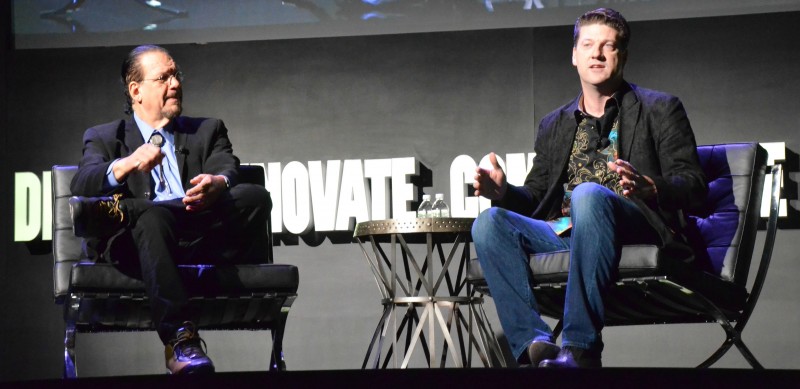Penn Jillette And Gearbox's Randy Pitchford Draw Similarities Between Magic And Video Games

Gearbox's Randy Pitchford and magician Penn Jillette kicked off DICE 2016 with an entertaining keynote about how video games and magic have a lot in common. The talk began with a video clip taken from The Wendy Williams talk show in which Jillette passionately defends video games, saying Call of Duty is as much art as William Shakespeare's work, and that games don't make people violent. Pitchford says Jillette is one of those people that is constantly defending the entertainment medium.
Jillette said we can't defeat death, pain, or suffering in the real world, but we can in art. He went on to say video games give a playful look at that fear and aggression, allowing players to comfortably explore these issues without anyone getting hurt. He talked about how Shakespeare couldn't work in the city of London for the same reasons people are against video games today. "It's the 21st century. Stop beating up artists," he said.
Pitchford added that "Entertainment gives us a way to experience joy and happiness. It makes us feel good."
Jillette focused a lot of his talk on how games are perceived. He discussed his frustration with American politics, citing Hilary Clinton's stance against violent games from 2005, in which she said, "We need to treat violent video games the way we treat tobacco, alcohol, and pornography. If you put it just really simply, these violent video games are stealing the innocence of our children, and it is certainly making the job of being a parent even more difficult." He then poked fun at the upcoming Presidential election, and had a colorful way of saying he would give Clinton his vote if the race was between her and Donald Trump.
Jillette and Pitchford then shifted gears to the experiences they are trying to create together for VR devices. They talked about how magic has branching paths just like many of today's story-driven games, and that magicians adapt as their tricks unfold. They said many tricks have different outcomes, and that the magician must adapt to how the person they are performing the trick on reacts. He compared that misdirection to video games, and how game developers must steer a player to a free choice – a perceived free choice.
Jillette said you learn how to play guitar and learn how to play piano, but you don't learn magic, you instead learn where the person's focus is, and learn how to exploit a certain degree of trust. Games are no different. Pitchford pointed out that technology like cloud computing is allowing game developers to add more outcomes to games.
The talk concluded with two magic tricks in which Pitchford showed how misdirection can be handled with an ordinary deck of cards. The second trick which was elaborate in construction, consisting of pictures of famous locations and figures in history, as well as a virtual reality headset strapped to the head of the person the trick was being performed on, again focused on misdirection, and showed how it can be just as easily handled in a game as the real world.
Jillette and Pitchford are currently working together on a VR-based reboot of the ill-fated Sega CD game Desert Bus for charity.

Get the Game Informer Print Edition!
Explore your favorite games in premium print format, delivered to your door.
- 10 issues per year
- Only $4.80 per issue
- Full digital magazine archive access
- Since 1991









